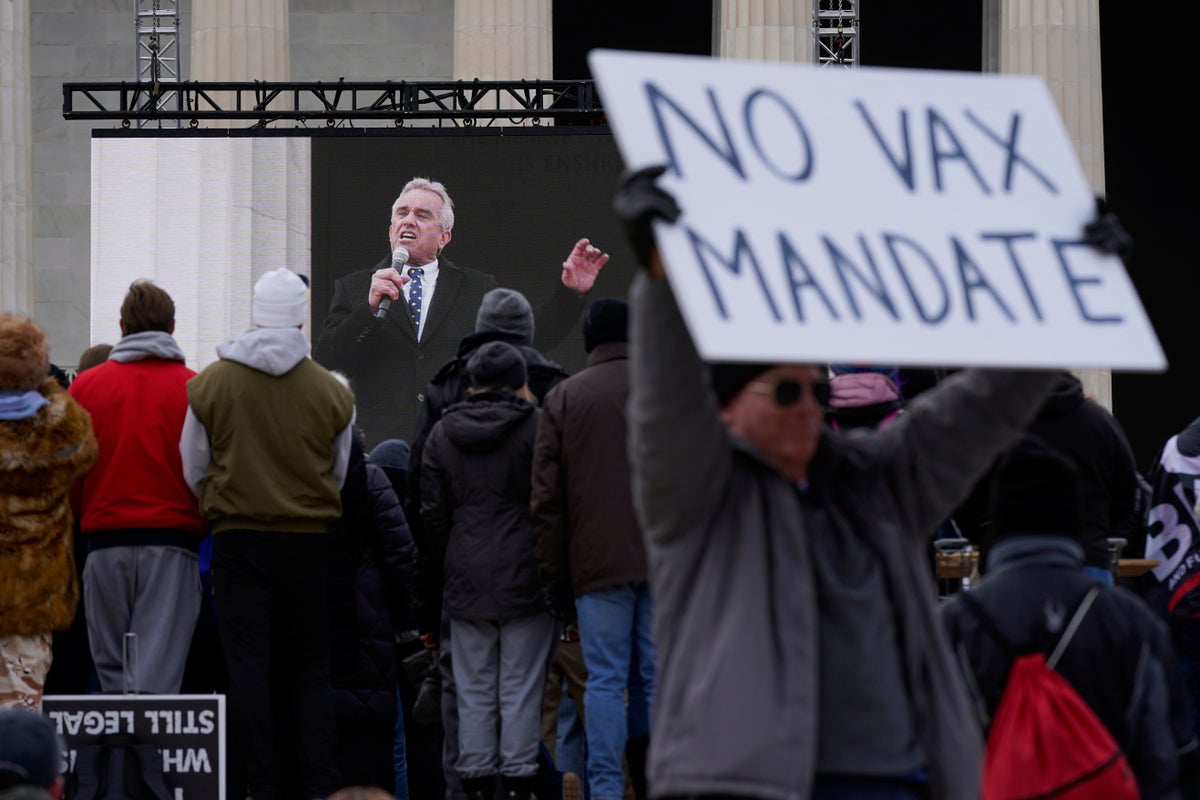
Facebook and Instagram have banned a prominent anti-vaccine group chaired by Robert Kennedy Jr for repeatedly violating guidelines around the spread of Covid-19 vaccine misinformation.
Children’s Health Defense, one of the largest anti-vaccine groups in the US, was blocked from both social media platforms Thursday, the non-profit confirmed via newsletter and through online statements shared on its still-active Twitter account, as well as Facebook accounts of its state-run chapters.
“Facebook is acting here as a surrogate for the Federal government’s crusade to silence all criticism of draconian government policies,” said Mr Kennedy, emphasising that information from the 2018-founded group would no longer be able to reach the hundreds of thousands of followers shared between the two main accounts.
“We don’t need the First Amendment to protect popular or government approved speech,” he added.
In screengrabs of the notifications the CHD received, Meta, the parent company of the two social media platforms, writes that both accounts have been suspended due to violations of “Community Standards on misinformation that could cause physical harm”.
“We encourage free expression, but don’t allow false information about COVID-19 that could contribute to physical harm,” the Facebook notification read, noting that the page would now be unsearchable on the platform and the user would be unable to access it.
Mr Kennedy, a self-proclaimed anti-vaxxer, is no stranger to what he characterised as deplatforming, having had his own personal Instagram account deactivated in 2021 due to the controversy-stirring posts he shared that went against scientific and public health consensus.
His personal Facebook account, which has more than 340,000 followers, remains active and a place where the star of one of America’s most famous families continues to spread falsehoods about public health responses to the pandemic and vaccines.
Mr Kennedy, the son of the former senator and US attorney general Robert F Kennedy, has emerged as a prominent figure in the anti-vaccine movement throughout the pandemic, earning his group the title as one of the “Disinformation Dozen” by the Center for Countering Digital Hate, who last year ranked the top 12 superspreaders of misinformation about vaccines and Covid-19 on the internet.
Included among the conspiracies propagated by the Harvard University alumnus’s group was the falsehood that vaccines for Covid-19 could cause organ damage and cause injury to pregnant people, while incorrectly arguing that shots used to treat tetanus would cause infertility.
Despite its lacking in evidence-based theories, the group surged in popularity during the Covid-19 pandemic, becoming one of the most popular “alternative and natural medicine sites” in the world, according to Similarweb, a company that analyzes web traffic and search. During its peak, CHD saw nearly 4.7 million visits per month, the company reported.
An investigation by the Associated Press found that the online popularity of the anti-vaccine group also translated into financial success for the non-profit, as filings with charity regulators showed that the group’s revenue more than doubled in 2020, to $6.8m.
For its part, Meta has noted that its policy about combating online misinformation around public health crises – more specifically in relation to the Covid-19 pandemic – might need to be revisited as countries around the world begin returning to a new pre-pandemic normal.
“To keep our users safe while still allowing them to discuss and express themselves on this important topic, we broadened our harmful misinformation policy in the early days of the outbreak in January 2020,” wrote Nick Clegg, Meta’s president of global affairs, in an open letter last month. Since the onset of the pandemic, he stated, the social media company has ramped up its efforts to dispel misinformation, removing more than 25 million pieces of content globally.
Before the pandemic, the company would only remove content – such as a specific Facebook post – when they assessed it could contribute to “a risk of imminent physical harm”.
“The change meant that, for the first time, the policy would provide for removal of entire categories of false claims on a worldwide scale,” he wrote, which included policies around “masking, social distancing and the transmissibility of the virus.”
Those measures, he conceded in the letter, might no longer need to remain in place as world leaders begin shifting policies to reflect a post-Covid reality.







